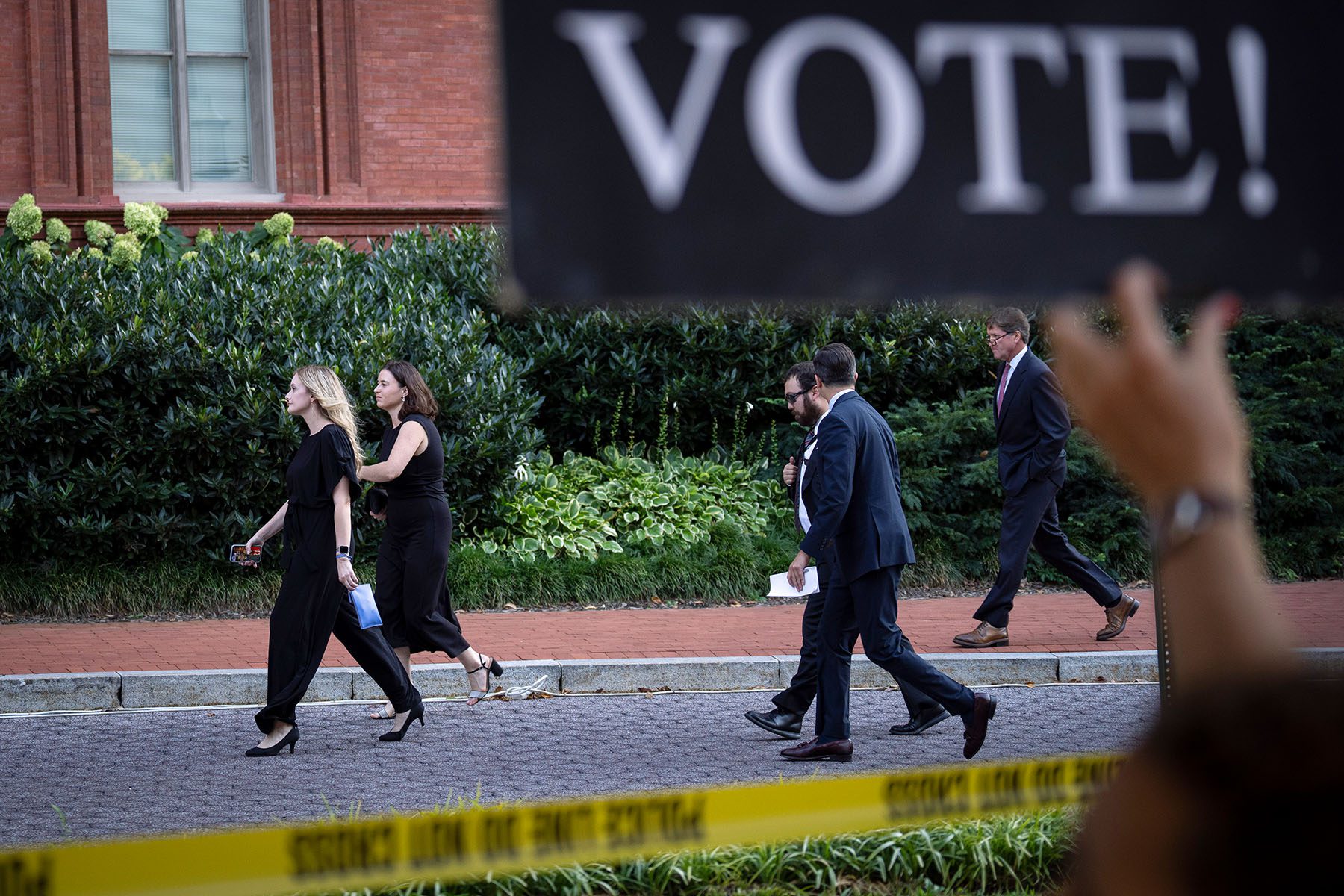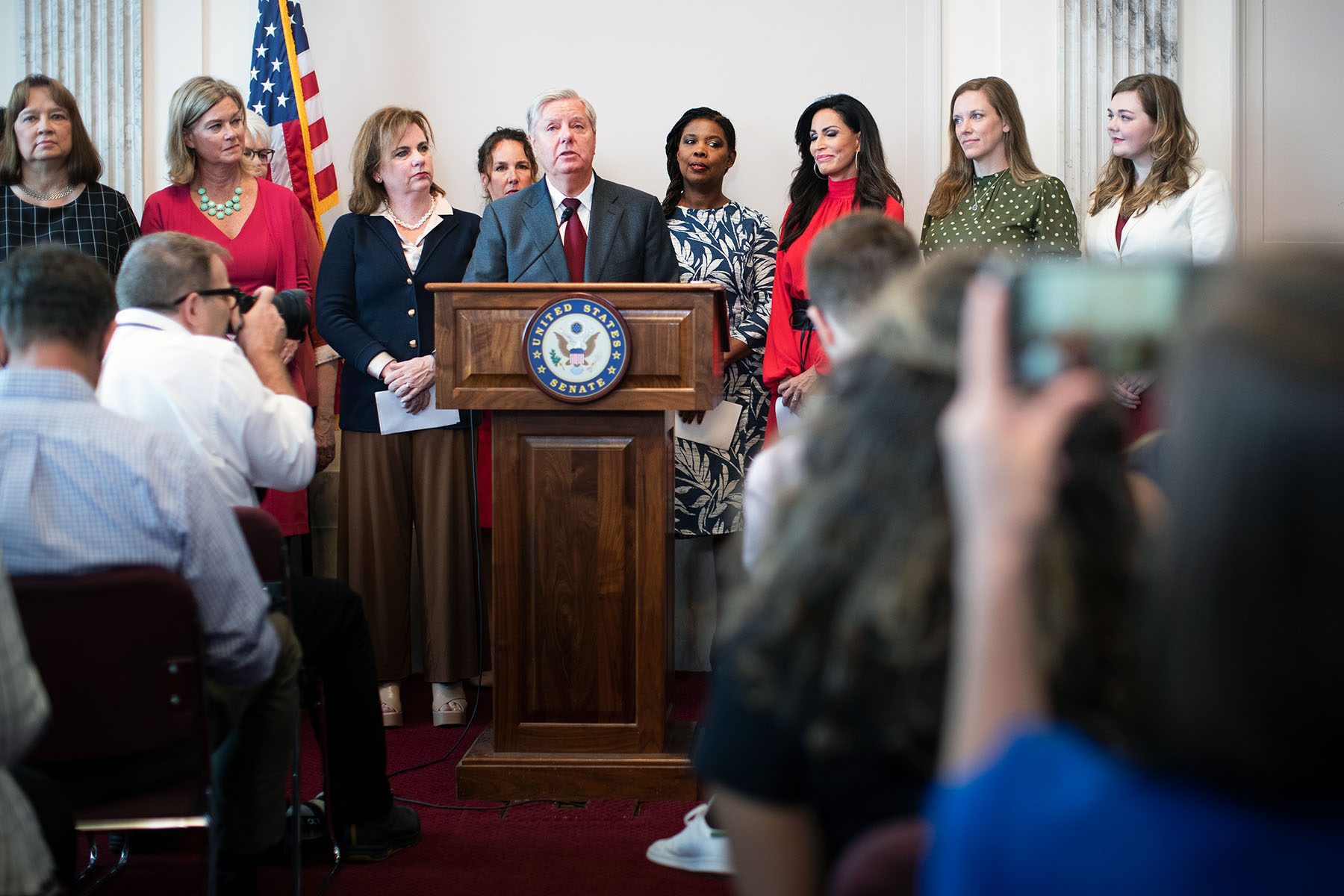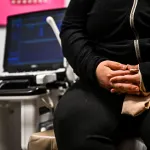Senate Republicans quickly distanced themselves from a national abortion ban introduced Tuesday by South Carolina’s Lindsey Graham. The bill, which seems unlikely to become law, would ban abortions across the country for people beyond 15 weeks of pregnancy.
Graham — who as recently as a month ago said abortion policy should be left up to the states — portrayed his bill as a compromise federal policy that does not prohibit all abortions, and pointed in particular to its written exceptions for people who become pregnant as a result of rape or incest.
“There will be exceptions for the life of the mother, for rape, for incest,” he said at a press conference Tuesday.
But exceptions for the life of the pregnant person are notoriously difficult to receive; physicians have said the requirement of providing abortions only in an emergency can force them to wait until a patient is in dire condition before providing them needed care. And the rape and incest exceptions written into the bill — much like the ones that exist in a handful of state abortion bans — are nominal at best, sexual violence and abortion policy experts said. They require reporting and paperwork that does not occur in the majority of sexual assault cases.
These exceptions require people to jump through significant logistical, legal and bureaucratic hoops that render them nearly impossible to utilize, experts said.
Accessing abortion through the rape or incest exceptions “would be exceedingly difficult legally — virtually impossible,” said Elizabeth Nash, who tracks state abortion policy at the Guttmacher Institute, including the impact of states’ alleged rape and incest exceptions. “These types of exceptions do a great disservice to sexual assault survivors.”
The Graham bill would require that adults who become pregnant after rape or incest receive “counseling” or “medical treatment” for the assault 48 hours before receiving an abortion. (The bill does not specify what kind of treatment, but that could include a forensic exam or treatment for physical injuries sustained during an assault.) If a minor who experiences rape or incest seeks an abortion, the assault must first have been reported to law enforcement or to “a government agency legally authorized to act on reports of child abuse.”
Abortions performed under those cases must be done “only in the manner which, in reasonable medical judgment, provides the best opportunity for the unborn child to survive.” This is a provision that is in many cases medically impossible to satisfy, Nash noted, since an abortion by definition terminates a pregnancy, and fetuses cannot live outside the womb until around 23 to 25 weeks. A requirement like this, she said, could discourage physicians from providing abortions even under these exceptions.
The majority of people who experience sexual assault are unlikely to meet the bill’s reporting requirement. In 2020, less than 1 in 3 cases of rape or sexual assault were reported to the police, per the Department of Justice. Many survivors do not report their assault to law enforcement for fear of being harassed, assaulted or having to go through a painful, traumatizing criminal prosecution process, noted Nicole Bedera, a sociologist who studies sexual violence.
Data also suggests that many people who experience rape or sexual assault do not go to the hospital or otherwise get medical treatment for the assault; those who do get care often do not immediately tell medical providers that they were assaulted. And minors in particular are often not equipped to navigate the legal reporting process, especially if assaulted or abused by someone known to them.
Rape-related pregnancy will affect 3 million women in the United States in their lifetimes, per the Centers for Disease Control and Prevention, and women raped by intimate partners are more likely to report rape-related pregnancy. (The data does not account for other people who can become pregnant.)

“These are crimes. Reporting them can be very, very difficult,” said Usha Ranji, associate director of women’s health policy at the Kaiser Family Foundation. “The structures of both the health care system care for sexual assault as well as the judicial system for addressing the crimes of sexual assault and incest already have a lot of holes in them. And now you’re putting that as a condition for obtaining medical care that somebody is seeking.”
Waitlists for assault-related counseling can last months, even if someone requests that service immediately after being assaulted, Bedera said. People who experience rape or sexual assault often do not immediately process what has happened, in large part because of the stigma surrounding being raped. That means people would have to understand quickly their assault, wait months to get counseling, and then wait 48 hours more to get an abortion, pushing them later into pregnancy.
“I don’t expect that anyone will be able to access the exemption, just because of the standards that exist,” Bedera said.
Requiring people report rapes to the police or seek counseling or treatment could put them in danger. Some also may be afraid of their counseling records being subpoenaed if any legal proceedings do follow. Even asking for confirmation that what happened was indeed rape — a common question — could put them at further risk.
“Survivors’ counseling records are often subpoenaed and used against them,” Bedera said. “You could have a victim who maybe did clear all these hurdles and got an abortion, but after, when government officials got those records, they could say, ‘Wow, she did question whether she was assaulted.’ That could open her up to criminalization or legal risk.”
-
Read Next:
Across the country, 11 states are already enforcing total abortion bans, and two more — Georgia and Ohio — do not allow the procedure after six weeks of pregnancy. A handful more states have abortion bans on the books that are currently blocked by state courts. A ban in Indiana is set to take effect this week. Another, passed Tuesday in West Virginia, has not yet been signed into law.
Only a few of those state laws retain exceptions for cases of rape or incest. But those that do follow a similar pattern to the Graham bill. In Georgia, Idaho and Mississippi, a rape must be reported to the police, and a copy of the police report made available before someone can receive an abortion. In Indiana, a physician must certify in writing that “the abortion is being performed at the woman’s request because the pregnancy is the result of rape or incest.” If enacted, West Virginia’s abortion ban would also require people report to law enforcement to qualify for an exception.
Abortion bans in North Dakota, Utah and Wyoming — all currently blocked in court — contain rape and incest exceptions. North Dakota’s and Utah’s bans require rape or incest be reported to the police. Wyoming’s ban does not specify what is needed to qualify for a rape or incest exception.
Already, federal rape and incest exceptions have shown themselves to be ineffective, Ranji noted. The Hyde Amendment, which prohibits the use of federal Medicaid dollars to pay for abortions, has an exception for cases of pregnancy caused by rape or incest. States can determine how people qualify for those exceptions. Government analysis has shown that, though these exceptions exist on paper, people almost never receive them.
That is likely to repeat in bans like Graham’s bill, or in the state laws being enacted and enforced, Bedera said.
“My main takeaway from these exemptions is they are a way for the Republican Party to avoid scrutiny for bills that take away the autonomy of people who are pregnant,” she said. “They’re not meant to work. They’re symbolic.”







